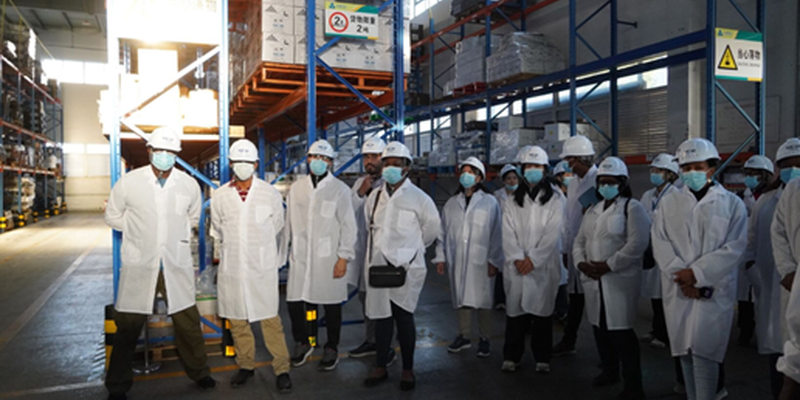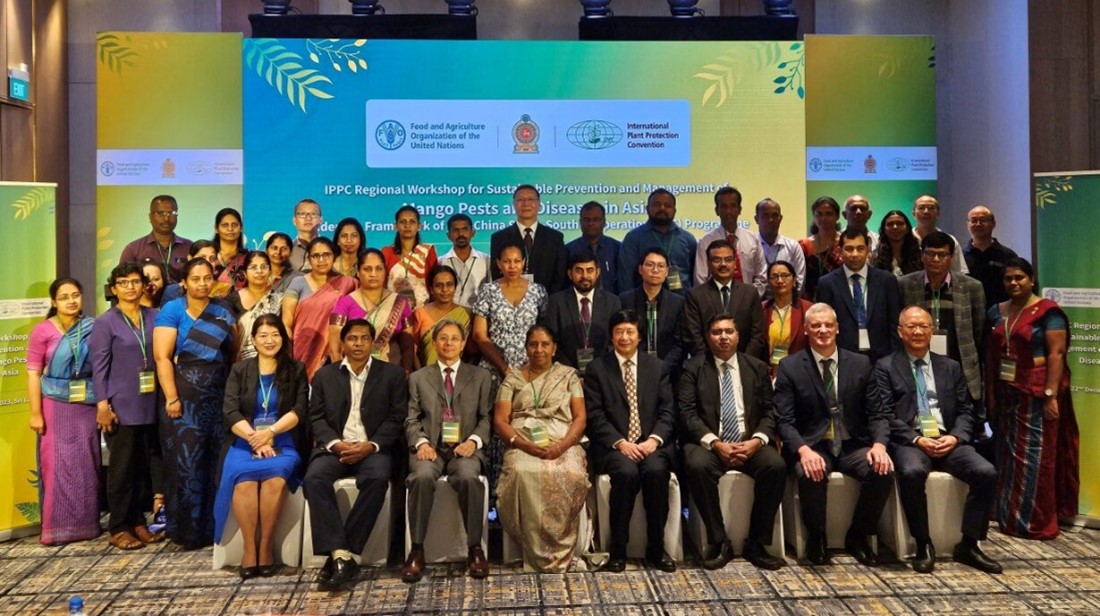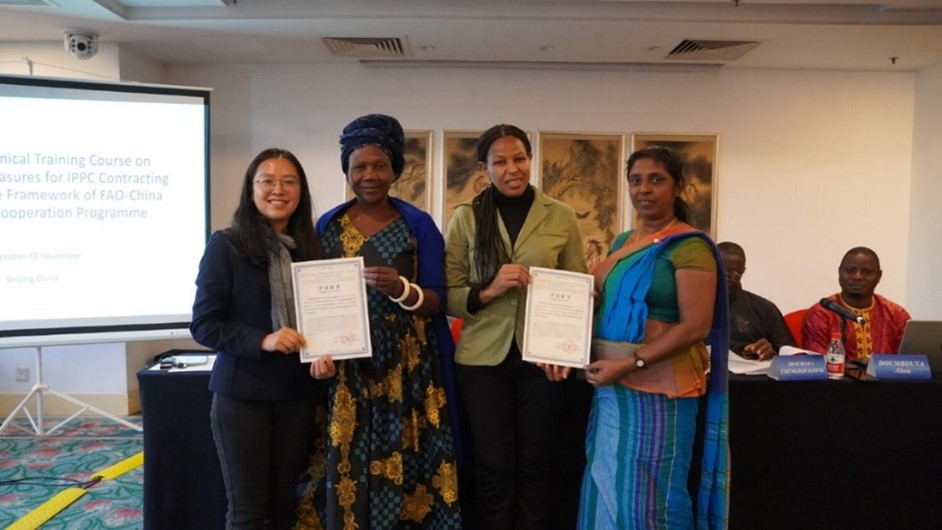South-South Cooperation: End of project heralds positive changes for plant health in Cambodia and Sri Lanka
Posted on Wed, 31 Jan 2024, 15:23

© IPPC Secretariat
Rome, 25 January 2024. December 2023 marked the end of a seven-year intervention led by the International Plant Protection Convention (IPPC) Secretariat to assist Cambodia and Sri Lanka in ensuring that the agricultural produce of its farmers meets the required phytosanitary standards for export and international trade, and that farmers gain market access for their agricultural produce.
The project, titled “Strengthening the capacity of developing contracting parties to implement the International Plant Protection Convention (IPPC) under the framework of the FAO-China South-South Cooperation (SSC) Programme”, recognized that for countries to ably implement the IPPC, the International Standards for Phytosanitary Measures (ISPMs) and other relevant plant health actions, an assessment of a country’s phytosanitary status was critical.
The project, worth USD two million, impacted hundreds of beneficiaries in the plant health community, including farmers, agricultural staff and policy makers in the pilot countries and globally. It also boosted the phytosanitary capacity of staff of national plant protection organizations (NPPOs) and other stakeholders in the two pilot countries.
Commenting on the closing of the project, Jingyuan Xia, Special Advisor to the Director-General of the Food and Agriculture Organization of the United Nations (FAO) and one of the project’s coordinators said, “Education, training, and skills development are fundamental for NPPOs to serve effectively. FAO is proud of the success of this initiative. We encourage Cambodia and Sri Lanka to strengthen their collaboration with academic and research institutions and international organizations, to build on the project’s achievements and advance their national systems".
Thanks to the project, the pilot countries have been able to fundraise for projects to improve their phytosanitary systems. So far, Cambodia is set to benefit from FAO’s One Country, One Priority Product (OCOP) programme, for technologies for the mango value chain.
“The IPPC commends Cambodia, Sri Lanka, FAO and the China South-South Cooperation initiative on these milestones,” said Osama El-Lissy, IPPC Secretary. “It is important for the plant health community to take advantage of existing and potential collaborations to advance plant health, and this was an opportunity well utilized,” he added. Sarah Brunel, the Implementation Facilitation Unit Lead, co-coordinated the project on behalf of the secretariat.
Some of the project’s key milestones.
Phytosanitary Capacity Evaluation
Cambodia and Sri Lanka successfully carried out phytosanitary capacity evaluations (PCEs) to assess the suitability of their national plant health systems to meet required international standards for food safety and safe trade in plant and plant products. Through the PCE process, they used a set of modules to identify gaps and opportunities that can be explored to uplift their national phytosanitary systems. Once the evaluation was completed, both countries held national-level workshops to present the results and appraise stakeholders (including policymakers) about the importance of PCE. Cambodia and Sri Lanka also drafted National Phytosanitary Capacity Development Strategies as blueprints for safeguarding their agricultural and plant resources, while facilitating safe trade of plant products.
The strategies focus on developing phytosanitary policies, conducting educational programmes, strengthening the capacity of relevant institutions, and elevating the knowledge of national stakeholders on core issues such as pest outbreak management.
According to Ker Monthivuth, Director of the Plant Protection, Sanitary and Phytosanitary Department of Cambodia, recognized as NPPO of Cambodia, Cambodia was fortunate to be a pilot country. It realized three key benefits, including a better understanding among the NPPO staff, of the work of the IPPC and international phytosanitary standards. With the implementation of the PCE, the NPPO gained a comprehensive understanding of the country’s available capacity to effectively implement phytosanitary activities. With that knowledge, Cambodia has developed a roadmap to guide the country’s efforts to improve its plant health system and infrastructure, while implementing proper phytosanitary measures. Thanks to this IPPC-led intervention, which introduced advanced technologies developed by China, Cambodia now has stronger capacity in terms of skilled personnel to control banana pests.
Capacity development
Stakeholders in the plant health community, including NPPO staff, agricultural officers, farmers, industry sector actors and other national players received training in different phytosanitary areas. In Cambodia, training included integrated pest management (IPM) technologies to combat Banana Fusarium wilt, phytosanitary measures, and field demonstrations of new Chinese technologies. Sri Lanka on the other hand, received technical training on surveillance, species identification, mass rearing and treatments of fruit flies on mango. This exchange of knowledge on innovative technologies, particularly from China, enriched the training course on IPM.

Participants of the IPPC regional workshop for sustainable prevention and management of mango pests and diseases in Asia ©IPPC Secretariat
Stronger partnerships for plant health
The project also strengthened collaboration in the global phytosanitary network, with events such as IPPC Advanced Technical Training Course held in Beijing, China from 30 October – 10 November 2023. Participants at the two-week event, organized by the IPPC Secretariat, FAO, the Ministry of Agriculture and Rural Affairs (MARA) of China, and the Center of International Cooperation Service (CICOS), discussed the project’s contribution to sustainable agriculture, plant protection and adoption of phytosanitary measures. They also discussed how to improve plant quarantine systems, pest monitoring and forecasting- including using cutting-edge technologies for monitoring and controlling plant pests and diseases, pesticides management, and integrated pest management. The event was an opportunity for contracting parties, mainly developing nations to strengthen their network and resolve to advance plant health, working with the IPPC Secretariat, the NPPO of China, FAO South-South Cooperation team and the NPPOs of Cambodia and Sri Lanka. Complementing the training were field trips and an FAO Global Symposium on Sustainable Fall Armyworm Management.

Some of the participants of the IPPC Advanced Technical Training in Beijing, China ©FAO
"Alignin g Sri Lankan rules, regulations, and legislation with global standards is imperative and key to overcoming cross-border issues arising from the incompatibility of certain rules and regulations, “said W. A. Raveen Thushara Wickramarachchi, Additional Director, Plant Quarantine and Senior Scientist, Plant Pathology at Sri Lanka’s National Plant Quarantine Service (NPQS). “In some instances, these disparities have created trade barriers. However, this project emphasized the importance of countries making the necessary upgrades to fit the evolving global trade landscape, “he added.
Related information
-
Success story: South-South Cooperation boosts expertise to protect plant health and livelihoods in Cambodia and Sri Lanka
-
Success story: Sri Lanka takes on a hands-on approach to strengthen plant health
-
Spotlight : Sri Lanka and Cambodia make progress in strengthening phytosanitary capacities, thanks to South- South Cooperation.

